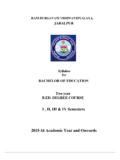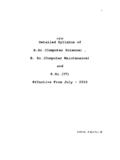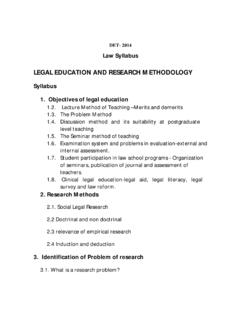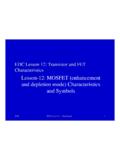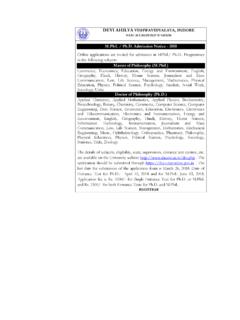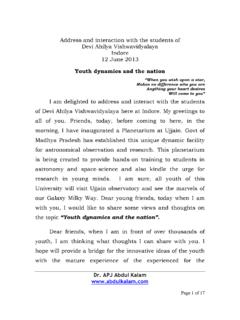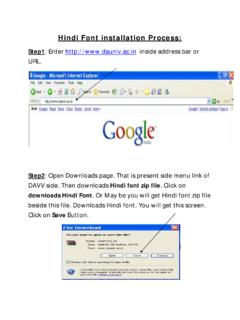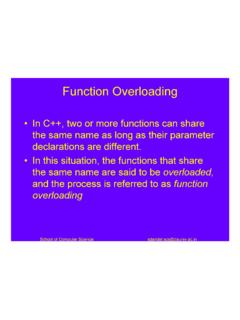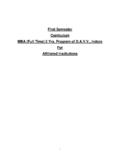Transcription of Fourth Semester Curriculum MBA (Full Time) 2 Yrs. …
1 Fourth Semester Curriculum MBA (Full Time) 2 Yrs. Program of , indore For affiliated institutions 2009 -2011. 1. Fourth Semester FT 401C Corporate Governance & Global Business Environment FT 402C Strategic Management FT 406C MRP 2nd phase FT 407C Compr hensive Viva-Voce A. Marketing Management FT 403M International Marketing FT 404M Service and Retail Marketing FT 405M Consumer Behavior and Rural Marketing B. Financial Management FT 403F International strategic Finance FT 404F Financial Engineering & Risk Management FT 405F Investment Analysis & Portfolio Management C. Human Resource Management FT 403H Compensation Management FT 404H Business Process Transformation FT 405 H Organizational Developments D. Information Systems Management FT 403I UNIX and Linux Operating System FT 404I Visual Basic Programming FT 405I Computer Networks E.
2 Production and Operations Management FT 403P Production Planning and Control FT 404P Total Quality Management FT 405P Business Process Reengineering 2. FT 401C Corporate Governance & Global Business Environment Objective To acquaint the participants with the fundamentals and practices of corporate governance in India and other countries in the light of the prevailing legal provisions and codes to good governance, and contemporary changes in the global business environment Examination Students shall be evaluated on two components, internal and end Semester examination. Internal component shall be of 20 marks based on continuous evaluation .The Semester Examination will be worth 80 marks, it will have two Section, A and B. Section A, worth 60. marks will comprise of seven theory questions out of which a student will be required to attempt any four questions.
3 Section B worth 20 marks will contain Cases. Course Contents 1. Corporate Governance: Evolution. Principles. Main Drivers, Theories and Models. Global Practices on Corporate Governance in the World and their impact on corporate world 2. Nature of International Business, Multinational Corporations , International Business Theories, Liberalization: Tariff & Non tariff barriers; World Trade Organization;. Recent Trends and main Drivers of international Trade, Foreign Direct Investment, 3. Political and Legal Environment, Cultural Environment, Managing Across Cultures, Negotiating Across Cultures, Economic. Technological Environment 4. International Strategic Management, International Organization Structure, International Strategic Alliances, Integration Between Countries, 5. Balance of payments, International Monetary Systems;Forex Markets and Risk Management, International Operations Management, International Marketing, 6.
4 International Financial Management, Financing Foreign Trade , International Accounting International Human Resource Management 7. Business Ethics; Corporate Social Responsibility World Economic Growth and the Environmental Issues; Future of International Business , E-Business Text books , , Global Business Environment, 2011 Tata McGraw Hill Francis Cherunilam International Business Environment, 2010, Himalaya Pub. House Parthasarthy Corporate Governance, Bizetantra 3. Sumit Khurana, Corporate Governance Dreamtech,Wiley Reference Books Daniels, Globalization &Business, PHI Learning Tamer Cavusgil-International Business-(Indian Reprint) Pearson Mandal, SK Ethics in Business and Corporate Governance 1e2010 Tata McGraw Hill V. Sharan-International Business-(Indian Original) Pearson Hamilton The International Business Environment, Oxford Press 4.
5 FT 402C Strategic Management Course Objective This is a top-level management course, and the objective of teaching this course is to enable students to integrate knowledge of various functional areas and other aspects of management, required for perceiving opportunities and threats for an organization in the long- run and second generation planning and implementation of suitable contingency strategies for seizing / facing these opportunities & threats. Examination Scheme: Students shall be evaluated on two components, internal and end Semester examination. Internal component shall be of 20 marks based on continuous evaluation .The Semester Examination will be worth 80 marks, it will have two Section, A and B. Section A, worth 60. marks will comprise of seven theory questions out of which a student will be required to attempt any four questions.
6 Section B worth 20 marks will contain Cases. Course Contents 1. Meaning, Need and Process of Strategic Management; Business Policy, Corporate Planning and Strategic Management; Single and Multiple SBU organizations;. Strategic Decision Making Processes Rational Analytical, Intuitive-Emotional, Political Behavioral; Universality of Strategic Management; Strategists at Corporate Level and at SBU Level; Interpersonal, Informational and Decision Roles of a Manager. 2. Mission, Business Definition and Objectives; Need, Formulation and changes;. Hierarchy of objectives, Specificity of Mission and Objectives. 3. SWOT Analysis, General, Industry and International Environmental Factors; Analysis of Environment, Diagnosis of Environment factors influencing it; Environmental Threat and Opportunity Profile (ETOP); Internal Strengths and Weaknesses; Factors affecting; Techniques of Internal Analysis; Diagnosis of Strengths and Weaknesses.
7 Strategic Advantage Profile (SAP). 4. Strategy Alternatives, Grand Strategies and their sub strategies; Stability, Expansion, Retrenchment and Combination; Internal and External Alternatives; Related and Unrelated Alternatives, Horizontal and Vertical Alternatives; Active and Passive Alternatives; International Strategy Variations. 5. Strategic Choice and Analysis; Managerial Choice Factors, Choice Processes . Strategic Gap Analysis, ETOP-SAP Matching, BCG Product Portfolio Matrix, Nine Cell Planning Grid; Contingency Strategies; Prescriptions for choice of Business Strategy; Choosing International Strategies. 6. Strategy Implementation, Concept, Barriers, Implementation Process; Project &. Procedural Implementation, Resource Allocation; Structural Implementation; Plan and Policy Implementation; Leadership Implementation; Behavioral Implementation, Implementing Strategy in International Setting.
8 7. Strategy Evaluations and Control, Control and Evaluation Process; Motivation to Evaluate;. Criteria for Evaluation; Measuring and Feedback; Evaluation and Corrective Action. Text books Kazmi, Ajhar Strategic Management and Business Policy, 3e, 2009 Tata McGraw Hill 5. Lomash & Mishra Business Policy & Strategic Management Vikas Publication Alpana Trehan Strategic Management 1st edn 2010 Dreamtech, Wiley A. Nag Strategic 2011, Vikas Publication Parthasarthy, Fundamentals of Strategic Management, 2008, Wiley India Reference Books Pankaj Ghemawat-Strategy and the Business Landscape, 2 Thompson Strickland, Crafting & Executing Strategy (SIE), 16e2011 Tata McGraw Hill Haberberg Strategic Management,2010 Oxford Press Tushman Managing Strategic Innovation& Change,2010, Oxford Press Wheelen/Rangarajan,Concepts in Strategic Management and Business Policy, 9/e Pearson 6.
9 FT 403M International Marketing Course Objectives The objectives of this course are to help the student to gain an understanding of concepts of International Marketing, types of international markets, demand and supply position in international markets, import-export documentation, policies and procedures of foreign trade. Examination Scheme: Students shall be evaluated on two components, internal and end Semester examination. Internal component shall be of 20 marks based on continuous evaluation .The Semester Examination will be worth 80 marks, it will have two Section, A and B. Section A, worth 60. marks will comprise of seven theory questions out of which a student will be required to attempt any four questions. Section B worth 20 marks will contain Cases. Course Contents 1. International Marketing: Basis of International Trade, Theories of International Trade Absolute Advantage, comparative advantage and factor endowment theory) Difference between Domestic, International, Multinational, Global Markets, EPRG Frame work.
10 2. Scanning of International Environment: Social, Political, Legal, And Economic. 3. Factors Affecting International Trade: Methods of Entry, Types of Regional Agreements, Role of IMF and WTO in International Trade. 4. Foreign Trade Policy: EXIM Policy 2002-2007 Salient features. 5. Export Documentation and Procedures and Institutional support for export promotion in India. 6. Product: Identifying New Products, International Product Planning, Product Design Strategy, Product Elimination, Adoption and Diffusion of New Products, Branding Strategies. 7. Pricing Strategies: Factors Affecting International Prices, Methods of Pricing, Pricing an International Product, Transfer Pricing, Exchange Rates and its Impact on Pricing, High Sea Pricing. 8. Distribution System for International Markets: Direct and Indirect Channels, Factors Affecting International Channel, International Channel Management, Wholesaling and Retailing.

